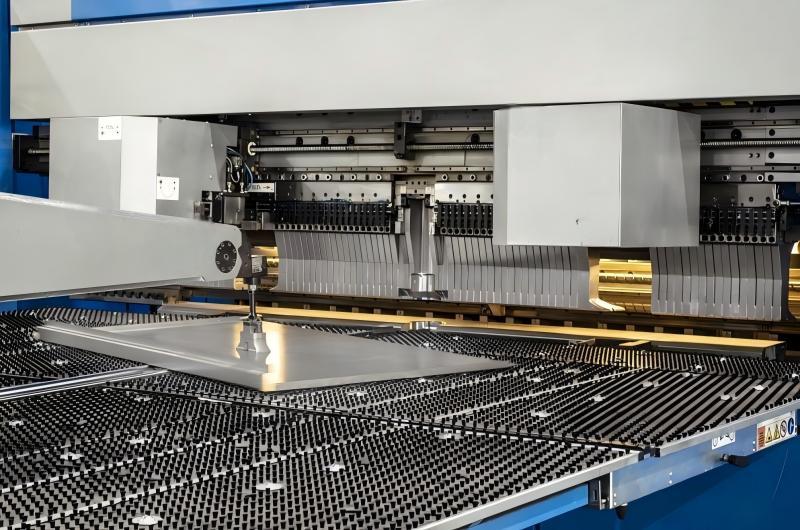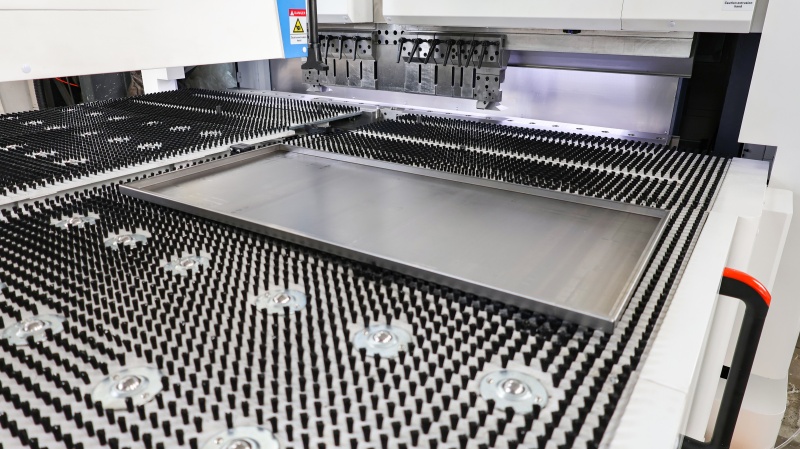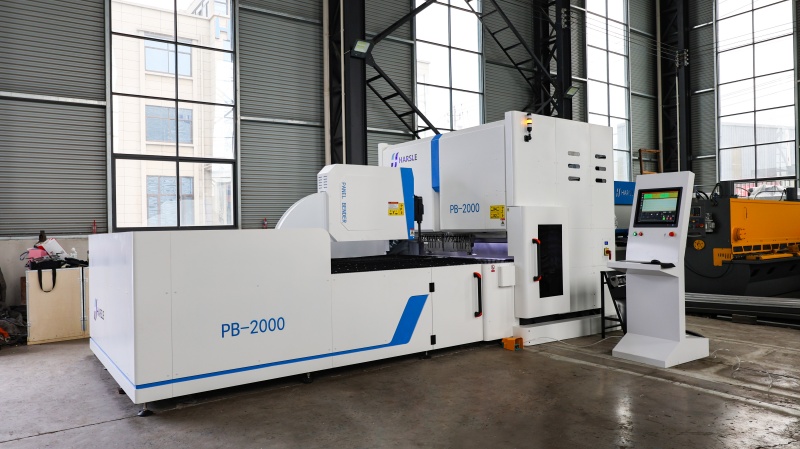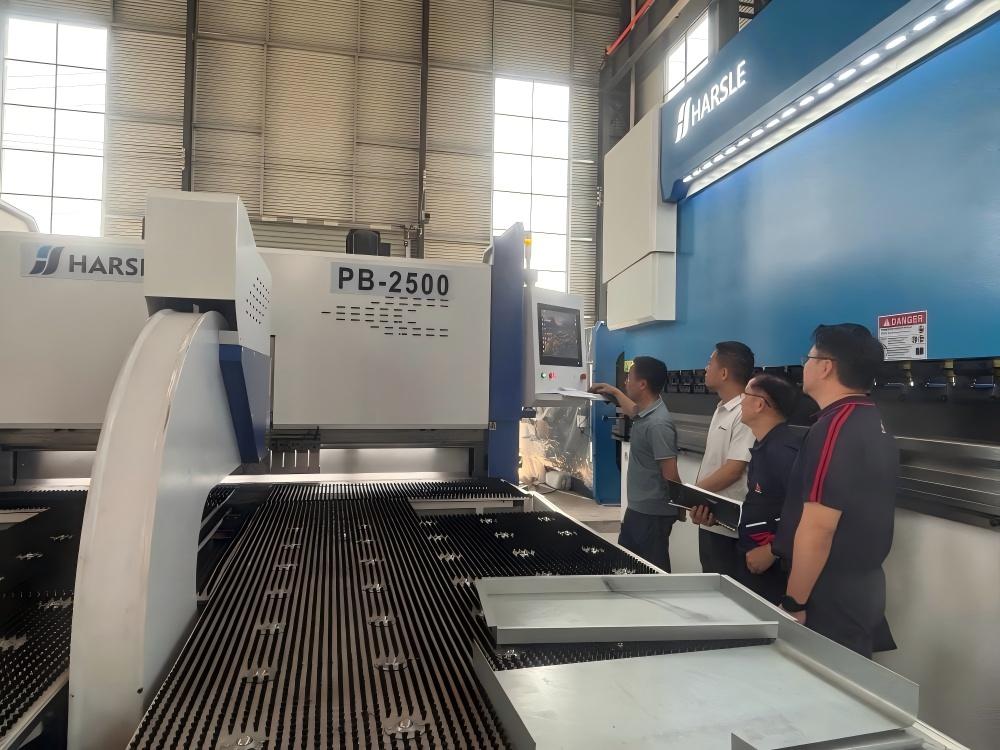Centre de documentation
Manuels et guides techniques complets pour vous aider à maîtriser les machines HARSLE et à optimiser votre efficacité dans le travail des métaux
Quelles sont les erreurs courantes à éviter lors du choix d’une plieuse de panneaux ?
- Comprendre le rôle d'un panneauteur
- Ne pas évaluer soigneusement les besoins de production
- Sous-estimation de la taille de la machine et de l'espace au sol
- Négliger les capacités d'automatisation
- Ne pas tenir compte de la maintenance et du support technique
- Choisir uniquement en fonction du prix
- Ne pas tester avant l'achat
- FAQ
- Conclusion
Choisir une panneauteuse pour votre atelier peut s'avérer complexe, surtout si vous investissez dans cet équipement pour la première fois. De nombreux fabricants recherchent les « Erreurs courantes à éviter lors du choix d'une panneauteuse » afin de s'assurer de faire un investissement judicieux, adapté à leurs besoins de production et à leur budget. Dans cet article, je vous présente les erreurs à éviter lors du processus de sélection afin que vous puissiez choisir en toute confiance une panneauteuse qui améliorera votre flux de travail et vous évitera de futurs tracas.
Comprendre le rôle d'un Cintreuse de panneaux

Une panneauteuse est conçue pour améliorer la productivité et la précision du pliage pour la production de tôles à grande échelle. Cependant, toutes les panneauteuses ne répondent pas à vos besoins de production spécifiques, et négliger des facteurs clés peut entraîner des inefficacités opérationnelles ou des coûts imprévus à long terme.
Ne pas évaluer soigneusement les besoins de production
Ignorer les types de matériaux et l'épaisseur
Avant d'acheter, tenez compte des types de matériaux que vous travaillez régulièrement, notamment de leur épaisseur. Certaines cintreuses de panneaux peuvent rencontrer des difficultés avec des matériaux plus épais ou plus durs, ce qui entraîne une perte de précision et une usure excessive de l'outillage.
Négliger la complexité des pièces

Si votre production nécessite des pièces complexes avec différents angles et rayons de pliage, il est essentiel de choisir une plieuse de panneaux offrant la flexibilité et les capacités de programmation adéquates. Ne pas tenir compte de ces contraintes peut entraîner des limitations qui ralentissent votre production ou nécessitent des interventions manuelles supplémentaires.
Sous-estimation de la taille de la machine et de l'espace au sol
Ne pas mesurer la surface au sol

Les cintreuses de panneaux sont disponibles en différentes tailles, et il est facile de négliger l'espace nécessaire à leur installation, leur fonctionnement et leur maintenance. Mesurez toujours l'espace de votre atelier et prévoyez les zones d'accès pour charger et décharger les tôles en toute sécurité.
Sans tenir compte de l'expansion future
Vos besoins actuels pourraient ne pas refléter votre croissance future. Choisir une panneauteuse incapable de s'adapter à des volumes de production plus importants peut limiter l'évolutivité de votre atelier et nécessiter un investissement supplémentaire plus tôt que prévu.
Négliger les capacités d'automatisation
L'automatisation est l'une des fonctionnalités les plus précieuses des plieuses de panneaux modernes, mais certains fabricants l'ignorent pour réduire leurs coûts initiaux. Sans automatisation, vous risquez de faire face à des coûts de main-d'œuvre plus élevés et à une régularité moindre, ce qui impacte votre productivité et votre compétitivité à long terme.
Ne pas tenir compte de la maintenance et du support technique

Ignorer la disponibilité du service local
Vérifiez si votre fournisseur propose un service local fiable et un support pièces détachées. Même les meilleures machines nécessitent une maintenance, et des temps d'arrêt prolongés peuvent avoir de graves conséquences sur vos opérations.
Négliger la facilité d'entretien
Choisissez une plieuse de panneaux offrant un accès facile pour les inspections de routine, le nettoyage et le remplacement des composants. Les conceptions complexes peuvent augmenter le temps et les coûts de maintenance.
Choisir uniquement en fonction du prix
Bien qu'il soit tentant de choisir l'option la moins chère, cela entraîne souvent des coûts plus élevés à long terme en raison d'inefficacités, d'une précision moindre et de réparations fréquentes. Concentrez-vous sur la qualité de fabrication, l'assistance et les fonctionnalités de la machine adaptées à votre flux de travail plutôt que sur le prix seul.
Ne pas tester avant l'achat

Demandez une démonstration en direct de la plieuse de panneaux avec vos échantillons, si possible. Cela vous permettra d'évaluer précisément les performances de la machine, sa précision de pliage et sa facilité de programmation, et d'éviter d'acheter une machine inadaptée à vos besoins.
FAQ
Quelles sont les erreurs les plus courantes à éviter lors du choix d’une plieuse de panneaux ?
Les erreurs les plus courantes incluent l’ignorance des types de matériaux et de la complexité des pièces, la sous-estimation de l’espace au sol, la négligence de l’automatisation, le fait de ne pas prendre en compte la maintenance et le choix basé uniquement sur le prix.
Comment puis-je m'assurer que la plieuse de panneaux répondra à mes besoins de production ?
Commencez par analyser vos volumes de production actuels et futurs, les types de matériaux et la complexité des pièces. Testez la machine avant l'achat et consultez le fournisseur pour déterminer vos besoins.
Pourquoi l’automatisation est-elle importante lors du choix d’une plieuse de panneaux ?
L'automatisation réduit les coûts de main-d'œuvre, améliore la cohérence et augmente la vitesse de production, offrant un retour sur investissement plus rapide et vous aidant à rester compétitif.
Conclusion
Choisir le bon cintreuse de panneaux est un investissement crucial pour votre atelier. En évitant ces erreurs courantes, vous vous assurez que votre machine répondra à vos exigences de production, soutiendra votre croissance et offrira des performances constantes. Besoin d'un conseil professionnel ou souhaitez explorer les solutions de panneauteuses les mieux adaptées à vos besoins ? N'hésitez pas à contacter l'équipe HARSLE. Nous sommes là pour vous aider à améliorer votre efficacité de production avec l'équipement adapté à votre activité.













